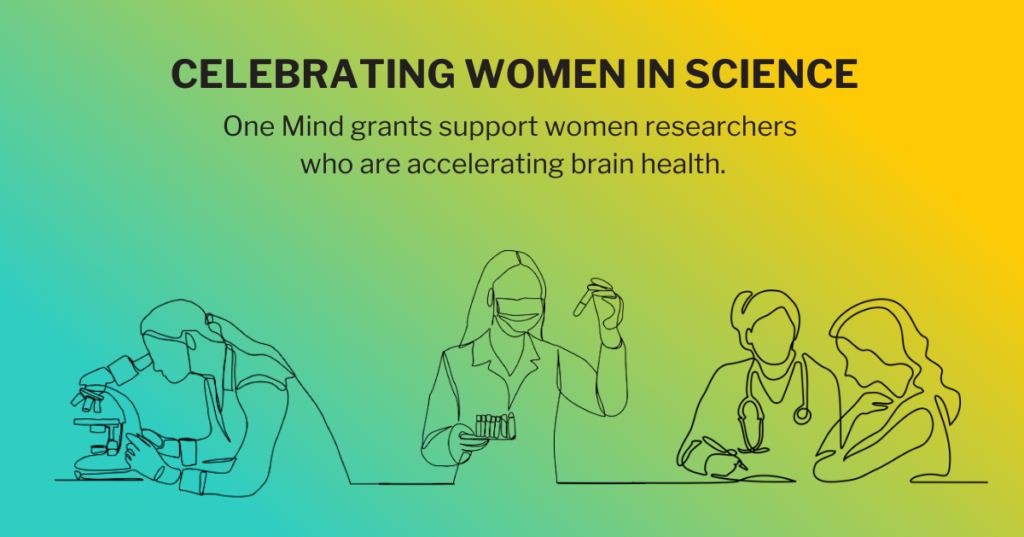Celebrating Women in Science

For Women’s History Month, and International Women’s Day, One Mind celebrates the female scientists across the world who have been steadfast in their efforts to accelerate science. We also recognize that often this path is filled with biases and challenges, and we strive to alleviate these burdens by remaining committed to funding diverse scientists.
Through our Rising Star Award, we aim to fund leaders in the neuropsychiatric realm— including the five acclaimed female scientists we are highlighting this month. As a Rising Star Award winner, each of these five scientists were given a $250,000 grant from One Mind early in their career to help accelerate their research over a three-year grant window. Both the research they led during their One Mind funded years, and the successes they have achieved since, are extraordinary and we are pleased to recognize them this month.
The remarkable scientists are:
Kate Fitzgerald, MD, Ruane Professor of Child and Adolescent Psychiatry at Columbia University

Dr. Fitzgerald was awarded the 2016 One Mind AIM for Mental Health Rising Star Research Award for her research on childhood anxiety. Dr. Fitzgerald’s current research involves using fMRI, EEG, and behavioral assessments to look for biomarkers of pediatric anxiety disorders to serve as neural targets for novel, mechanism-based treatments. Dr. Fitzgerald is particularly interested in how cognitive behavior therapy (CBT) improves brain function in anxious youth.
Learn more about Dr. Fitzgerald’s funded research
Susanne Ahmari, MD, PhD, Associate Professor of Psychiatry at the University of Pittsburgh

Dr. Ahmari was awarded the 2018 One Mind Janssen Rising Star Translational Research Award in Honor of the Late Jeffrey S. Nye, M.D., Ph.D. for her research on Obsessive-Compulsive Disorder. Dr. Ahmari uses a variety of optogenetic, transgenic, imaging, electrophysiology, molecular and genetic techniques to study the neural causes of compulsive behaviors in mice. In line with her clinical interest in OCD, her lab is also working with human postmortem tissue to look for molecular substrates of OCD. In 2021, Dr. Ahmari was named the Program Director of Wellcome Leap’s Multi-Channel Psych program, a $50M program that is striving to reveal the mechanisms of anhedonic depression.

Learn more about Dr. Ahmari’s funded research
Erin Dunn, ScD, MPH, Assistant Professor of Psychiatry at Massachusetts General Hospital and Harvard Medical School


Dr. Dunn was awarded the 2018 One Mind Peter Chiarelli Rising Star Collaborative Research Award for her research on depression. Dr. Dunn uses interdisciplinary approaches to better understand the social and biological factors that influence the etiology of depression among women, children, and adolescents. The goal of her work is to identify the causal mechanisms underlying risk for depression, translate that knowledge to population-based strategies for prevention, and target those strategies to “sensitive periods” in development.
Learn more about Dr. Dunn’s funded research
Jennifer Coughlin, MD, Associate Professor of Psychiatry and Behavioral Sciences at Johns Hopkins University
Dr. Coughlin was awarded the 2019 One Mind Gifford Foundation Rising Star Schizophrenia Research Award for her research on schizophrenia. Dr. Coughlin’s research focuses on molecular neuroimaging techniques, with core competency in positron emission tomography (PET) and magnetic resonance spectroscopy. She leads an interdepartmental initiative to apply new PET-based radiotracers to the study of neuroimmunity and other molecular factors that contribute to diseases affecting mood and cognition.
Learn more about Dr. Coughlin’s funded research
Denise Cai, PhD, Associate Professor of Neuroscience at the Icahn School of Medicine at Mount Sinai
Dr. Cai was awarded the 2019 One Mind Otsuka Rising Star Research Award for her research on posttraumatic stress. Dr. Cai’s research investigates the circuit-level mechanisms that may underlie the heightened response to innocuous stimuli following the experience of trauma using a broad range of techniques, tools, and behaviors to identify the brain regions involved in the processing of trauma memories at the molecular, cellular, and circuit levels in a mouse model.
Learn more about Dr. Cai’s funded research
One Mind is proud to have supported the above five scientists during the early stages of their careers and is thankful for the achievements they have made— as scientists, role models, and as thought leaders in neuropsychiatry.
Please visit the Rising Star Awards page of our website to learn more about the investigators One Mind supports.
